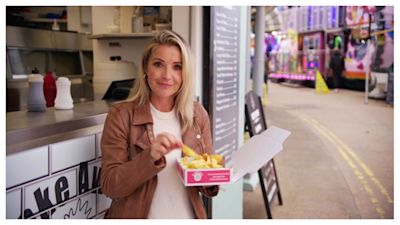What's Really In Our Food? ITV Tonight investigation uncovers something fishy

It’s now eight years since the horse meat scandal shocked the nation and exposed gaps in how our food standards are policed.
So, with increasing pressures on our councils and experts believing we’re more vulnerable to food fraud - can we really trust what we’re eating? Helen Skelton investigates.
Professor Louise Manning, of the Royal Agricultural University, tells ITV Tonight: “We always have to be aware that we could get another case like the horse meat scandal in the future.
"Vulnerability can change very very quickly, and the pandemic’s an example of a rather major social shock.”
Councils under pressure
Last year we spent over one hundred billion pounds on food - and takeaways have been very popular especially during the pandemic.
It’s led to new food businesses springing up - but how well are they being monitored?
The Tonight programme sent a freedom of information request to councils in England, Wales and Northern Ireland, asking how many new food businesses had registered with them in the year since the start of the pandemic.
They reported 55,000, which is just the number given to us by the councils that responded.
New food businesses are supposed to have an initial hygiene inspection within 28 days of registering, or from when they start operating, according to the Food Law Code of Practice set out by the Food Standards Agency.
The programme reveals that under 9% of new food businesses were visited within the first month and over half of them were still awaiting inspection over a year later in some cases.
Emily Miles, of the Food Standards Agency, said: “So we agree there is a backlog, and it does need addressing, so for instance in June this year there were sixty-five thousand or so businesses awaiting inspection and that’s a high number and it’s higher than we would normally expect.
"But we also can see in June this year that local authorities managed 12,000 inspections.
"If this situation were to persist for a long time we would start getting concerned.”
Most new food businesses will be doing the right thing, but there are potential risks if these checks aren’t being carried out - such as food poisoning or undeclared allergens.
In March 2020, with Covid spreading, the FSA advised local authorities to postpone physical inspections, replacing them with remote assessments via phone or video, particularly for what they classed as low risk businesses - like cakes being sold out of a domestic kitchen.
Now they want them back out there and have given authorities around £1 million to help do that.
However, some councils are reporting that they have been struggling to keep up with inspections, even before the pandemic.
“We’re coming up with a spending review," said Ms Miles. "The government needs to make sure it gives local authorities enough money so that they can rebuild those food teams and it’s not just about this year it’s about training people for the future.”
Britain’s best loved dish…
The Tonight team looked into types of fish up for sale in chippies in the UK. One type of fish, often labelled as ‘huss’ or ‘rock’ are actually different species of shark, legally allowed to be sold under those labels.
In a survey conducted by OnePoll, they asked 2,000 people if they knew what huss was if they saw it on a menu with 70% of respondents saying no.
10 samples were taken and sent to a lab to find out what’s really under the batter. They reveal that six of those samples were Spiny Dogfish and two were starry smooth-hound. Both species of shark that can be labelled and sold as huss or rock.
But there was also another type in there, called Portuguese dogfish, which legally shouldn’t be labelled in the same way.
Dr Andrew Griffiths, of The University of Exeter, said: “I’ve never come across Portuguese dogfish on sale here in the UK and that’s a really interesting finding because it's a deep shark, it’s not something that’s so easily captured so it’s a real surprise.”
The types of shark included under those labels can be fished sustainably, often from fisheries in North America.
Andrew Cook, of the National Fish Fryers Federation, said: “What our advice is to ask the fish and chip shop owner, just ask behind the counter, they should be able to tell you their sourcing policy and they'll let you know if it’s sustainable."
Traceability Tech
So, as a consumer, how can we really get to the bottom of knowing what we’re eating?
One tech company, Provenance, has been at the forefront of leading technology.
Watch the video to see how it works:
Jess Baker, of Provenance, said: “We’re here to be kind of that trusted third party that sits between the brand and the shopper, making sure what they’re saying is credible, making sure it really is the full story and the full supply chain.”
How to check the safety of your food and report any concerns:
Reporting a food crime and in Scotland
Search for hygiene ratings via the FSA